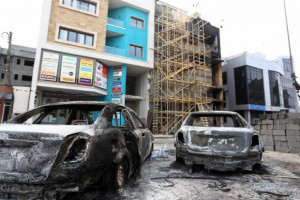
Today, the prevailing political uncertainty, the on-going civil war and the West’s inability to find a genuine political formula for settlement are providing the jihadi groups the much needed context for recruiting people like the 22 year old Salman Abedi. Will the West be able to locate the locus of terrorism in its own polices?
The Fictive Peace Deal!
6 years into the crisis, Libya, just like other countries, such as Afghanistan, that faced NATO intervention, remains a largely unsettled territory. Despite the ‘peace deal’ reached between the warring faction, peace remains elusive. On May 2, it was reported that rival Libyan leaders, Fayez al-Sarraj, the leader of the UN-backed government, and military strongman Khalifa Haftar, have reached an agreement that could help end years of chaos that have gripped the country since its 2011 “uprising.”
While the meeting itself constitutes a significant development, the deal offers nothing to the people of Libya. Far from a way forward to peace and democracy, the deal, if implemented. would sow seeds of military rule in Libya and keep real peace a shadowy hope only. At first sight, the proposed agreement would seem acceptable as a broad framework. It talks about the unity of the army, fighting terrorism and government restructuring, and proposes holding presidential and parliamentary elections in 2018. But the devil is in the details.
One of the main aspects of the deal is re-constitution of the Presidency Council, a Council that would not only see a reduced membership but will also see Libyan army gaining a upper hand because of the presence of armed forces commander. Could then the Libyan Presidency Council be a truly “civilian body” and bring the country’s forces under civilian supremacy? It seems hardly plausible to happen given that the Libyan army, working under Sarraj, is not likely to leave the political space it has captured, unless it has enough guarantees about its future position.
A similar sort of un-clarity is prevailing about the question of elections. The key question that many Libyans have in their mind is who will hold the elections as both factions have repeatedly refused to recognize each other’s legitimacy?
Therefore, what the peace-deal is offering in material terms is nothing but illusions of peace. There have been some signals of possible openings for dialogue in recent weeks but nothing concrete has materialised. The main factions, as such, seem more interested in holding on to whatever power they still retain rather than engaging in new negotiations, implying that the political crisis (with its violent spillovers) will most likely continue without a decisive settlement in 2017. Although various political actors contest the legitimacy of both the PC and the associated Government of National Accord, a lack of consensus among Libyans, neighbouring states and international stakeholders on what should replace it suggests these institutions will remain in place even as their effectiveness deteriorates and opponents consolidate their positions.
If peace is denied, can terror be far behind?
In the absence of peace and the West’s ability to settle the chaos it had itself unleashed, what we can expect is continuous war. Unsurprisingly, the visit of Peter Millett, the British ambassador to Tripoli as part of on-going investigation into Salman Abedi’s Libya connection, was eventful. Upon his arrival, parts of the capital echoed to exchanges of gunfire between two of the armed factions fighting for control of the city. Millett has even taken it to Twitter to report hearing `explosions and artillery fire’, probably providing him an insight into why people like Abedi continue to pour in every now and then and plan attacks in Europe and why thousands of Libyans remain a part of global jihadi networks.
More recently, even according to Western estimates, up to 2,000 made their way to Syria to join IS and other extremist groups, while the gunmen who killed 38 tourists in Sousse, Tunisia, was reportedly trained at an IS base in the west of Libya. German investigators believe Anis Amri, who drove a truck into a crowded Christmas market in Berlin last year, had contacts there.
All of these cases point to one simple stark reality of the Libyans who continue to be exploited for social and economic deprivations by the jihadi groups and act as pawns in their agendas. The youth unemployment rate is close to 40 per cent, while inflation tops 30 per cent. There are rolling electricity outages and a severe lack of hard currency. Low oil prices and instability have hampered crucial oil production, forcing a great many of Libyans to choose war and jihadist ideology over dubious peace under Western domination.
While British authorities equated last year the Libyan scenario with that of Somalia, calling Libya a ‘Somalia on the Mediterranean’, little thought did they seem to have given to the possibility of that ‘Somalia’ repeatedly attacking Europe, and indeed their own home. For the British authorities, it is important to investigate into Salman Abedi’s Libyan connection, but it appears even more important for them to investigate into the crucial connection between denial of peace and spread of terror.
Salman Rafi Sheikh, research-analyst of International Relations and Pakistan’s foreign and domestic affairs, exclusively for the online magazine “New Eastern Outlook”.
